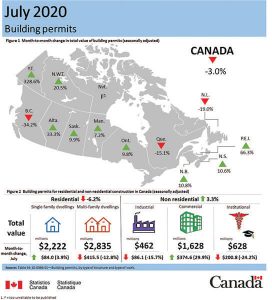The Conference Board of Canada: the focus is wage subsidies

With the economy starting to re-open, Canada’s recovery has begun. How long will this recovery take is the question that economists wish they knew the answer but considering we are living unprecedent times, pinpointing a date will be hard. The Canadian economy suffered its worst three-month stretch on record in the second quarter, coming to a near halt in April before starting to recover in May and June. According to Statistics Canada, the real gross domestic product contracted at an annualized rate of 38.7 per cent for the quarter, the worst posting for the economy dating back to when comparable data was first recorded in 1961.
This coming Monday (7), Canadians will celebrate Labour Day and this year things will look very different. Sectors like travel, hospitality, transportation and entertainment were hit hard by the pandemic and who knows if some of them can never return to pre-pandemic levels. If we look at Canadian building permit values for July, they went down 3% on a national level, compared with the same month of the last year. In Quebec the permit values are down 15.1% according to Statistics Canada. To protect jobs, the Government of Canada is proposing to extend the Canada Emergency Wage Subsidy (CEWS) by four weeks, from August 30 to September 26. The Conference Board of Canada has the same opinion and says that the next step has to be wage subsidies. This week, Pedro Antunes, chief economist of the research institute, told Milénio Stadium that the focus now should be moving from CERB to something where employment can be encouraged. Antunes exemplifies with the European case where they focused more on the wage subsidy and were able to mitigate the employment rate. According to the federal government, the CEWS has supported more than three million Canadians since the start of the COVID-19 pandemic. The employers who qualify for the CEWS would be able to claim up to a maximum benefit of $847 per week.

Milénio Stadium: Monday (7) we will celebrate the Labour Day Holiday, but with COVID-19 the labour market has changed a lot. How is the Canadian economy doing and what are the Conference Board of Canada’s predictions?
Pedro Antunes (PA): We do have assumptions to where the economy is headed. The most important assumption is when will the vaccine be ready and distributed in Canada. We are not experts in epidemiology, but we are trying to read as much as we can and create an informed assumption of when that may be. We assume that by June of next year, Covid will be behind us in Canada and things can return back to normal in Canada, within the domestic economy. Hopefully, not too long after that, we will see the problem ease at a global level and see people travel by the fall or end of next year.
We are going to see the reemergence of Covid 19 cases. We think it will be localized, we will see shutdowns in specific industries and specific regions perhaps. Nonetheless, I think we got good enough at containing and identifying the breakouts to a point where we won’t return to a generalized stop of the economy as we saw in March and April.
MS: How do you see the Canadian private sector in the post-pandemic era?
PA: We shouldn’t forget that Canada is mainly a knowledge economy, even though we often talk about manufacturing or resources bases, of course, these are important sectors that drive the service side of the economy. If we look at the last few years, we had a very solid labor performance through the years. The job creation has been in the knowledge economy, that includes financial services, architect services, engineering services. We have seen an enormous growth defined by Statistics Canada as Other Professional Scientific Technical Services and that’s a big gathering of big wages industries. In fact, the knowledge economy has been able to operate fairly well within the Covid, essentially because most of these companies are able to do telework.
In terms of short-term programs that intend to help businesses cope, especially in those segments that will the hardest hit, I think it will be a difficult environment. A lot of these companies, like restaurants, will be operating in an environment with fewer capacity, higher costs associated with maintaining the guidelines and the health criteria, which means an environment that will not be very profitable. One of the things the Conference Board has been suggesting is that we really need to focus on wage subsidies, move from something like the CERB to one where we encourage employment through a wage subsidy and that subsidy will help businesses survive and at the same time creating those jobs and a little of security for households. Essentially household’s income has been supported through this crisis, we have seen very strong after-tax income growth despite the recession, which is rare and its due to these support programs.
Now households are telling us that their consumer confidence is down; they are worried about their future employment. The wage subsidy would be a good option to help survive during this period until we have a vaccine or a treatment. If I may add, Canada took a big hit on employment during the shutdown but other countries, in Europe for example, focused more on the wage subsidy and were able to mitigate the employment rate.
MS: Currently the US-Canada border is closed to non-essential travel until September 21 and some sectors are suffering more than others.
PA: For the travel industry and any business related to tourism, food and beverages services and events, all of these industries that require people getting together socially, are going to be troubled, and this is where the assumption for the vaccine availability is important. What we see is a very tough situation for small and large businesses in Canada operating during Covid.
Regarding the economy, we look at the data from Statistics Canada, we are very aware about how deep the recession was during the first and second quarter. We essentially saw the second quarter drop 12%, but already know in the monthly data that we are recovering. The question is how far can we recover? Statistics Canada is giving us a flash estimate for the July GDP, it tells us that we were still operating at 6% below compared to February. 6% is huge, we’ve taken this deep bite at the economic activity in the first half of the year and up to July we are still operating at 6% below. Most of the industries that are reflected in those 6% are the ones we talked about: tourism, air transportation and others.
MS: Assuming that in the second wave the outbreaks would be localized, would it be easier to deal with the outbreaks compared with the first wave? Can we expect more lockdowns?
PA: I think this is what is evolving right now, we will see breakouts here and there. We have become better at identifying and responding to them. Closing businesses or regional economies if necessary, that’s how we envision. People talk about a second wave – we are already there; If we see something really ramp up, like in the US, that’s a whole different ball game. We are hopeful that we won’t see that happen here, we don’t have that in the assumptions forecast.
MS: How is the new Canadian labor market? Do you think some of the changes caused by Covid will stay in place for the next few years?
PA: We are trying to get a handle on how much will Covid-19 change the world post Covid. There are some negative implications to Covid, the difficulties we are going to find ourselves in a couple of years. But there are also some positives, during the crisis there were very quick adoptions of technology by Canadian businesses to keep contact with their costumers, the adoption of telecommuting and we will see other ramifications… I think these are positive because it gives us the ability to work remotely and deliver more effectively and perhaps, see some productivity gains in some sectors. In terms of the labor market we will see some changes, more telework in the future and I think that is the biggest change right now.
We are talking a lot about social safety net, transitioning CERB or the wage subsidy. I think that are a number of challenges to putting in program that casts a bigger net in terms of employment security, because these things are costly and require a saving in fiscal dollars somewhere else. The social safety net works more in a provincial level, we need to get organized federally and provincial. The implications will strain public finances and the creation of new long-term programs will be difficult.
“The sense we get with the current US administrations is that nothing is secured”
MS: Will social distancing and PPE in the work environment affect productivity?
PA: I think so, we often say that productivity is like evolution – it requires a shake before we see significant change. I think we are seeing some changes in terms of adoption of technology but also the logistics around supply chains which adopted new technologies and are more flexible to reduce risk. We will have to wait and see how productivity runs up in different industries, but there is hope that we will see technology adoption boost productivity in Canada.
MS: Will the economy suffer if women can’t return to the workforce at pre-Covid levels?
PA: We have seen that a lot of the occupations that were hit the hardest tend to be occupations performed mainly by women. In part, I think there will be a situation where some of these sectors won’t fully return to normal until a year down the road. That will definitely hurt the economy. Another important portion is childcare, if they don’t have the option or don’t want to send their kids to school and people’s ability to work in a Covid environment. This is something the government and employers need to be aware of and we need to make accommodations to ensure we can have women fully back in the workforce, if the jobs are there.
MS: On her first day on the job, Minister of Finance Chrystia Freeland said that the restart of the economy needs to be green. Could the reduction of emissions cause a backlash from Canadians, specially Alberta?
PA: If we are injecting more money in infrastructure, this is an opportune time to think about infrastructure that will help to reduce greenhouse gas emissions. I don’t think people that are in provinces that are oil dependent will necessarily be against these measures, in fact oil producers and some of the provincial governments are looking for ways to reduce carbon emissions even though they are developing sectors that are intense in carbon. It’s a win-win if we can do both.
For Alberta, I think the issue would be that we allowed big companies to invest in the oil sector, we have made that choice and, now when we are in fact producing, we don’t want to be necessarily halting the production at the tail end of the investment. If you want to mitigate investments further on that’s a different story, this is an issue of how to turn the page and focus on the environment with the new money that is available, if we choose to do that.

“We need to be careful with broader measures of protectionism, especially if it’s public policy”
MS: Over the past few months, Canada and the US have been in a constant trade war, regarding items like aluminum and wood. Can this war hurt employers and employees here?
PA: Canada is a trade dependent economy, not only on the resources side but also across every industry. We are north/south focused in terms of commercial exchanges. It’s important to have a good relationship with the US. I think a lot of the damage that has been done is due to the current administration and the vilifications of NAFTA.
During this period, there was a lot of uncertainty for a lot of businesses around access to the American consumer. Even though we have been successful on signing a new trade agreement with the US, we have seen the uncertainty arose in investments in Canada. We see that in the auto sector and even generally, we are lagging in terms of investments.
The sense we get with the current US administrations is that nothing is secured, even though we have a trade agreement we are still seeing a treat to some of our products. The US is the most important market for our trade, but China has been a market that allowed for growth and it’s also an area where we have had difficulty in terms of our commercial relationship.
MS: Global protectionism is growing around the world and Canada is going in the same direction. On one hand, protectionism creates jobs but on the other it increases prices. Which one will Canadians choose?
PA: That is a tough question! We have seen consumers worried about buying local and support local businesses at a higher cost and that is terrific. I do think we need to be careful with broader measures of protectionism, especially if it’s public policy. For example, we have seen talks about putting a new program that ensures the choice of local suppliers, but that falls against the trade rules. If we are choosing to secure supply chains because a product is essential for our economy, health or security, we need to be very careful with the protectionist thoughts.
Free trade is something that brought the global poverty significantly down over the last 20 years. There has been strong evidence that this has been a positive thing not only for developing but also developed economies. We have been able to increase the purchasing power due to global trade. I think there is a cost we need to be aware of and certainly in Canada, considering our dependency on global trade.
If we look at consumer goods, a lot of that is assembled overseas, the cost of bringing that production home would be exorbitant. And those are not the jobs we intend to bring to Canada, as I’ve said before, the Knowledge jobs are better jobs, that’s were our strength is. We are not a country that is abundant in labor, right now we have more people unemployed, but generally speaking, if things return to normal the labor market will tighten up. We don’t want to be competitive in looking for labor intensive jobs.
MS: With unemployment and bankruptcies, will salary increases remain on hold?
PA: Unemployment has been high, we haven’t seen a lot yet on the bankruptcy side, but I agree. Over the next year, the difficult environment we are going to face, especially if we start to see some of the support measures running dry, we will probably see more bankruptcies. Aside from that, I think profits have been really strain over the crisis and I think we will see that reflected in wage increases. It’s important to know that when we look at average wage, through the Statistics Canada perspectives, average wage has increased because we have lost so many low paying jobs. If you look into reality, at wages being paid, I think employers are going to be holding back and the economy situation dictates that.
MS: What are the Conference Board of Canada’s projections for the next months?
PA: Statistics Canada gave us information up until June, we have seen a surge in consumer spending, at least returning to normal levels. There have been fundamental structures changes to where and how people consume and what kind of goods they are purchasing. Other important positive point is that incomes have been secured despite employment loss. Aside from the industries we talked about where difficulties will remain, I think there are opportunities in the Canadian economy, and we will continue to see improvements as we go forward. We have seen a lot of spending from the provincial and federal government and the repercussions that will see in the future have been downplayed. We borrowed from the future to support incomes and the normal activity right now, but there are going to be consequences on public finances.
Joana Leal/MS








Redes Sociais - Comentários